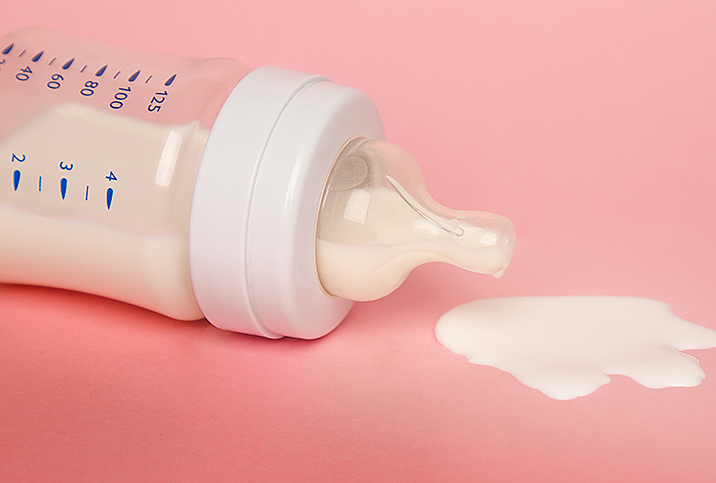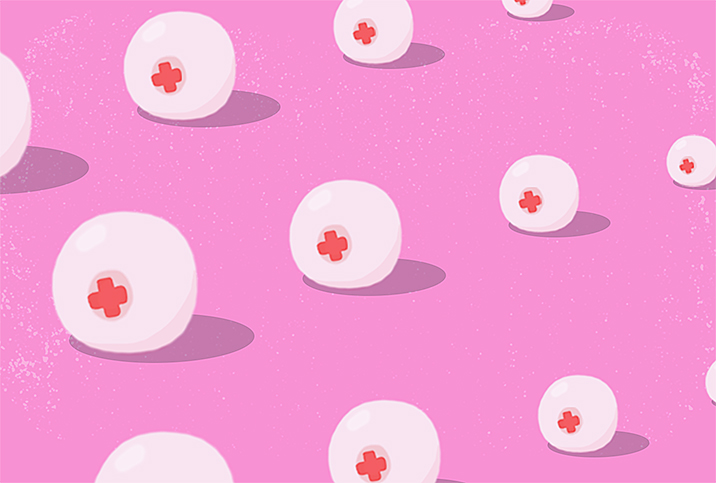Breastfeeding When Sick or Taking Medication Is Usually Fine

Breastfeeding can be challenging enough for new moms running on little sleep and adjusting to a whole new reality. But postpartum life can get even more difficult when you get sick and have to worry about your own health and the possible health implications for your baby.
Can you take medication while nursing? While we all want the best for our babies, it can be confusing to know the right choice to make and how to take care of everyone.
Breast milk nourishes babies and can also pass on positive substances like antibodies, but what about harmful substances? It's easy to wonder if feeding your baby while sick can make them unwell and whether you can pass medication through your breastmilk.
Don't worry, mama. We've got the answers.
In most cases, keep breastfeeding when you are unwell
Generally, you can continue to breastfeed when you are ill, and in many cases, it can be beneficial for your baby if you do.
"For most illnesses, coughs, colds and diarrhea, it's absolutely fine to breastfeed as long as you feel well enough to do so," said Gareth Nye, Ph.D., a lecturer of anatomy and physiology at University of Chester Medical School in Chester, England. "You may actually be benefiting your baby long term by continuing to breastfeed."
Your body produces antibodies to illnesses you are going through, and these can pass into your breast milk, Nye explained.
When you are ill, it's more important than ever to continue to breastfeed, according to Lily Foggan, a midwife and antenatal teacher at From Bumps to Babies in Bicester, England. Breast milk changes, and these antibodies can aid your baby's immune system and prevent them from catching the same illnesses, Foggan said.
"Breast milk is so amazing, it knows when your baby is sick, needs to grow or needs to sleep," she added.
If you are suffering a bug, cough or cold, the risk of infection does not come through breast milk.
'For most illnesses, coughs, colds and diarrhea, it's absolutely fine to breastfeed as long as you feel well enough to do so.'
"Generally, the risk comes from the natural spread of disease, not through the breast milk itself," Nye said. "Maintain good hygiene so as not to pass any illnesses from other routes, like nose, mouth and hands."
While it's hard to avoid close contact with your baby as you are feeding, you should try to stop the spread when possible.
Watch out for bacterial infections, particularly foodborne types such as salmonella, which would be particularly unpleasant for an infant, Nye said. Common colds and viruses, including COVID-19, can't be passed to your baby via breast milk, but a small number of other infections can be passed.
"The big concern is around viral infections, particularly ones that live within blood," Nye said. "Those that have been seen in breast milk include HIV and human T-cell lymphotropic virus, which should be known by the parent in advance. Other viruses, like hepatitis B and C and cytomegalovirus, are also serious health concerns."
In most circumstances, people with these infections can breastfeed safely. However, if you have or think you have any of these conditions, it's important to discuss breastfeeding with your doctor.
Taking medication is often fine—but check with your doctor
Many common over-the-counter drugs are fine to take while nursing, however, there are exceptions.
"Most medications you would normally take are safe for use during breastfeeding, including paracetamol [acetaminophen], most antibiotics and most antidepressants, however, you should always seek medical advice before taking on new medication during this period," Nye said.
Two common products you should avoid while nursing are decongestants and certain painkillers.
"Some cold and flu medications are fine; others aren't, particularly those which have a form of decongestant medication," Nye explained.
Specifically, decongestants including pseudoephedrine and phenylephrine can significantly reduce milk supply and may cause infant irritability. Additionally, the pain medication codeine is not advised, nor are illegal drugs, Nye said.
Daily low-dose aspirin is appropriate per the LactMed database (75 to 325 milligrams daily) and is not detectable in breast milk. However, in high doses of aspirin, a significant amount is transferred to breast milk. Your doctor may advise a low-dose regimen to treat certain health conditions. For example, aspirin is used for thromboprophylaxis and is being studied for prevention of postpartum preeclampsia.
If you're thinking of taking herbal medications and other medicines that have not been fully researched, talk to your doctor first. While your doctor should be aware of any prescription medication you're taking, double-check to be sure, Nye advised.
Some people can feel anxious about taking medication while they are breastfeeding even if they have the medical all-clear.
"I see this in particular with mental health medication, but you need to remember you are important," Foggan said. "It's unlikely the medication will affect your baby if you've had it reviewed by your doctor. If you're not well, who's going to care for your baby? Weigh up the risks, write down pros and cons so you can logically weigh it up."
Don't forget to look after yourself
While keeping your baby well might be top of mind, it's important to look after yourself if you are unwell and nursing. Breastfeeding when you are unwell can be tricky and exhausting. You might feel "touched out," and self-care for new parents can feel out of reach, especially if you are ill.
"Your body will keep producing milk for your baby, but it's important you look after yourself, too," Foggan advised. "Make sure you are well hydrated. Ask for support, too. Hopefully, you have a good support network around you who will care for you whilst you care for baby."
Although it can be hard, focusing on yourself is far from selfish and benefits your baby, too. By being informed, you'll be able to make the best choices for you and your family. Get well soon.



















